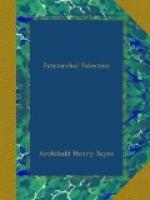When he again emerges, it is as a middle-aged man, rich in flocks and herds, who has won two wives as the reward of his labours, and is already the father of a family. He is on his way back to the country which had been promised to his seed and wherein he himself had been born. Laban, his father-in-law, robbed at once of his daughters and his household gods, is pursuing him, and has overtaken him on the spurs of Mount Gilead, almost within sight of his goal. There a covenant is made between the Aramaean and the Hebrew, and a cairn of stones is piled up to commemorate the fact. The cairn continued to bear a double name, the Aramaean name given to it by Laban, and the Canaanitish name of Galeed, “the heap of witnesses,” by which it was called by Jacob. The double name was a sign of the two populations and languages which the cairn separated from one another. Northward were the Aramaeans and an Aramaic speech; southward the land of Canaan and the language which we term Hebrew.
The spot where the cairn was erected bore yet another title. It was also called Mizpah, the “watch-tower,” the outpost from which the dweller in Canaan could discern the approaching bands of an enemy from the north or east. It protected the road to the Jordan, and kept watch over the eastern plateau. Here in after times Jephthah gathered around him the patriots of Israel, and delivered his people from the yoke of the Ammonites.
Once more “Jacob went on his way,” and from the “two-fold camp” of Mahanaim sent messengers to his brother Esau, who had already established himself among the mountains of Seir. Then came the mysterious struggle in the silent darkness of night with one whom the patriarch believed to have been his God Himself. When day dawned, the vision departed from him, but not until his name had been changed. “Thy name,” it was declared to him, “shall be called no more Jacob, but Israel; for as a prince hast thou power with God and with men, and hast prevailed.” And his thigh was shrunken, so that the children of Israel in days to come abstained from eating “of the sinew which shrank, which is upon the hollow of the thigh.” The spot where the struggle took place, beside the waters of the Jabbok, was named Penu-el, “the face of God.” There was more than one other Penu-el in the Semitic world, and at Carthage the goddess Tanith was entitled Peni-Baal, “the face of Baal.”
The name of Israel, as we may learn from its equivalent, Jeshurun, was really derived from a root which signified “to be straight,” or “upright.” The Israelites were in truth “the people of uprightness.” It is only by one of those plays upon words, of which the Oriental is still so fond, that the name can be brought into connection with the word sar, “a prince.” But the name of Jacob was well known among the northern Semites. We gather from the inscriptions of Egypt that its full form was Jacob-el. Like Jeshurun by the side of Israel, or Jephthah by the side of Jiphthah-el (Josh.




